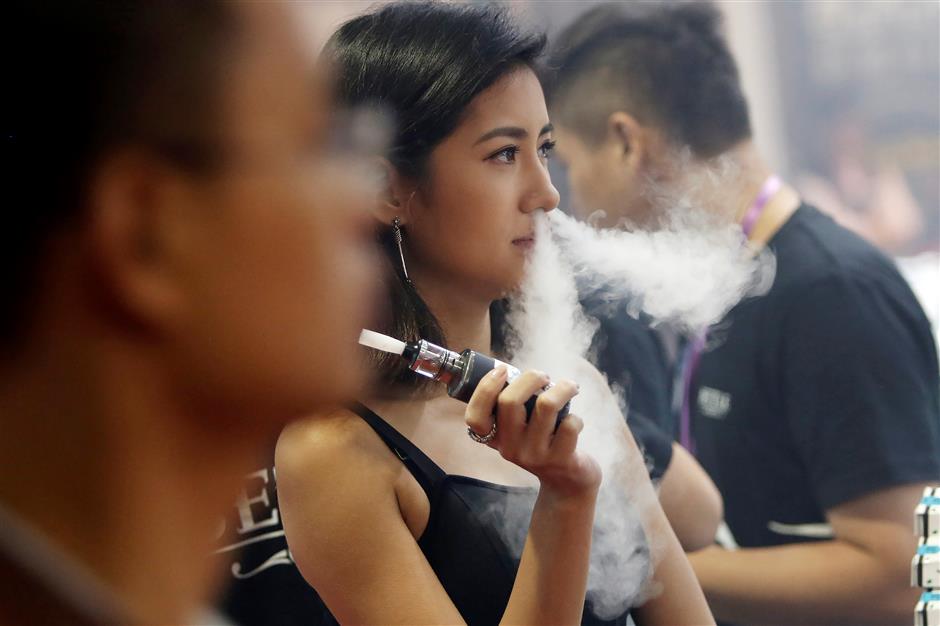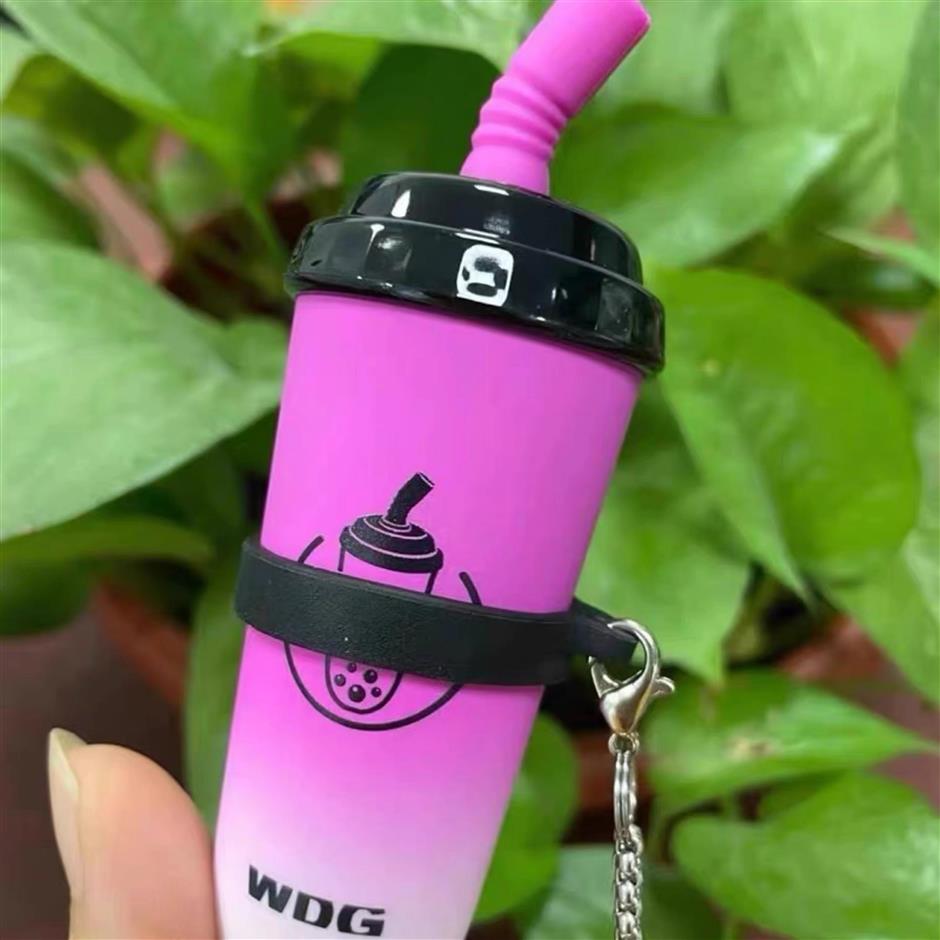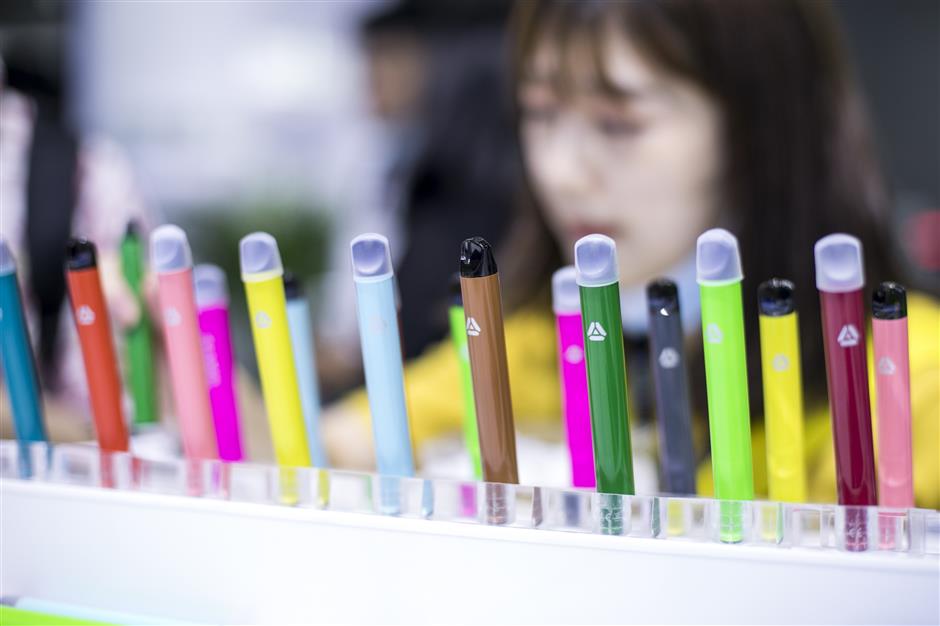The smokescreen of vaping: how young e-cigarette users fall into a trap

A model smokes at an e-cigarette expo in Beijing.
It's hard to quit smoking cigarettes, but turning to vaping on the belief that it is a safer alternative can also be a trap.
Mai Jiawei, a senior high school student in the southern city of Zhuhai, spent a year quitting electronic cigarettes. Now he is urging other young people to give up vaping.
"Quitting tobacco feels like 100 people working in your brain who suddenly lose their daily bonus from the boss," Mai said on his livestream account on Bilibili. "They will definitely go on strike."
Known as "Fantastic Mike" on his livestreaming program, Mai shares his thoughts with 10,000 online followers.
"To me, there are two kinds of addictions: one from the nicotine and, more importantly, one from the feeling of relaxation," a female classmate of Mike's said in an interview on his program.
She said she and most of her classmates never realized they were actually "smoking" when they turned to e-products that claimed to be "atomized sugar."
Indeed, e-cigarette retailers are clever at marketing and disguising the true ingredients of their products. They aim their pitches at the young and promote their products as harmless, trendy and non-addictive.
China has joined a handful of countries in banning flavored vapes. Starting October 1, e-cigarette companies are allowed only to sell tobacco-flavored vapes. But that doesn't appear to have thwarted manufacturers who keep coming up with ingenious subterfuges and advertising enticements.

A "milk tea cup" e-cigarette available on Taobao.com.
One of the more recent products – quite illegal – is a flavored e-cigarette that claims to be "gas gum" or a "milk tea cup." It has become popular with teenagers.
These disposable e-cigarettes are being sold at between 60 yuan (US$8.60) and 150 yuan on e-commerce platforms and social media, cloaked as "milk tea cups" or "coke cups" to dodge regulations.
The gadget, about 10 centimeters long, looks like a USB storage unit with a nozzle. The product feature flavors such as strawberry, mint, ice cream and coffee – all banned by China's Tobacco Monopoly Administration.
No information about the manufacturer or production date is printed on the packaging, except for an English warning reminding users that the "nicotine involved and can be addictive." The sellers claim the products are for export only.

An illegal blueberry flavored e-cigarette being sold online.
Health data show that juveniles with vaping experience are twice more likely to become addicted to mainstream tobacco in the future.
According to a 2021 survey from China's Center of Disease Control and Prevention, some 86 percent of junior high students had heard of e-cigarettes, and 16 percent were using them. Both figures were up from 2019.
About 64 percent of students who use e-cigarettes said they prefer fruit flavors, according to the survey.
Illegal products are accessible on most mainstream social media and livestream platforms, including Weibo, WeChat and Douyin, China's version of TikTok. A discussion group related to "milk tea cups" on Weibo has over 2,500 followers.
"Five students among the 2,000 or so in my school have been found vaping 'milk tea cup' e-cigarettes," a local high school teacher surnamed Ren complained in an online post.
He said the cartoony appearance of the products and their fruit flavors were attracting other students to follow suit.

A "gas gum" being sold online mainly targets the underage.
Wei Wenfeng, a popular livestream host who tests the quality of children's products, castigated manufacturers who deliberately design e-cigarettes as cute, snack-like toys.
"Where is your conscious?" asked Wei in one of his recent programs, which was viewed by over a million users on Douyin.
According to the tests conducted by Wei's team, an e-cigarette that claimed to be "gas gum" is comprised of a battery, an atomizer and unknown liquid. Lab analysis found the liquid contains nicotine and the carcinogen formaldehyde, along with other ingredients that can harm the brain development of teens.
One 19-year-old woman posted on Douban that she has become short of breath when climbing stairs after just three years of vaping.
"Quit as fast as you can," she urged in the post.

Colorful e-cigarettes are designed to appeal to young and particularly female consumers.
A milk-tea e-cigarette user surnamed Chen told China Youth Daily that he was mainly attracted by the fruit flavor of the products.
"Most e-cigarette users dislike the taste of tobacco," he said.
Chen said he had bought three "milk tea cups" from WeChat retailers. Most online retailers don't check ages. Some online vendors even made overtures to him about becoming an "agent" to promote the products to schoolmates, dangling the idea as very profitable.
"Profits from e-cigarettes are huge, and many manufacturers are willing to risk legal repercussions because they want a share of that pot," said Chen Zhong, an e-cigarette industry insider.
China has the world's largest population of smokers and is the largest producer and consumer of tobacco. Adolescent exposure to e-cigarette is being blamed for the growing number of Chinese smokers.

Most products at a Relx e-cigarette store have been removed from shelves to adhere to new national standards.
China's Ministry of Finance recently increased the tax rate on the production and import of e-cigarettes to over 40 percent, causing retail prices to jump.
Over 70 percent of legal e-cigarette retailers in October complained that they can no longer make ends meet, while only 7 percent said they still were showing profits, according to an online survey released by domestic research institute Bluehole.
The more the government cracks down on e-cigarettes, the more the trade goes underground, Chen said.
WDG, a Shenzhen-based e-cigarette brand, announced in August that it had stopped the production of all fruit-flavored e-cigarettes, but it admits fake products are still rampant.
"Four manufacturers are producing about 10,000 fake WDG 'milk tea cup' e-cigarettes every day," an official of the company said. "But they are difficult to trace because most of their transactions are made through WeChat or QQ."
Tobacco authorities in multiple cities have begun crackdowns on illegal production and sales of flavored and "disguised" e-cigarettes.
"Both the illegal manufacturers and agents will be punished and severe violations could lead to criminal charges," an official with the Shenzhen Tobacco Monopoly Bureau said.















